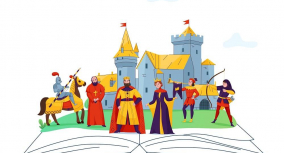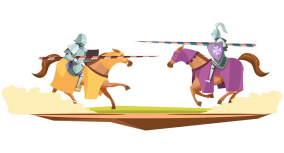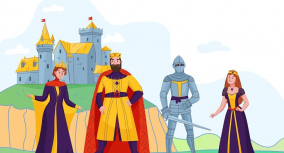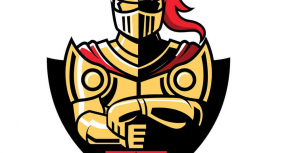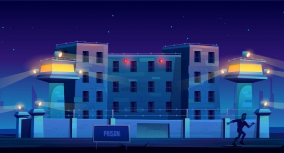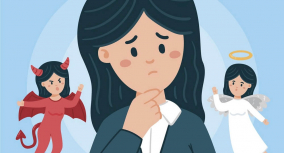There is more than one Sir Gawain and The Green Knight theme for discussion. The anonymous author explores various concepts such as nature, love, and mortality. Still, the most eminent themes in Sir Gawain and The Green Knight are chivalry and honor.
In this article written by our custom-writing experts, you’ll find an in-depth analysis of the epic romance’s primary concepts with answers to the following questions:
- What are the central themes in Sir Gawain and The Green Knight?
- What’s the importance of the honor to the characters and the events?
- How do the values of chivalry affect the characters in the poem?
Keep reading to learn all about the themes of Sir Gawain and the Green Knight!
What Is the Message of Sir Gawain and the Green Knight?
The central message of Sir Gawain and the Green Knight lies in the struggle between human aspirations and frailty. It can be formulated as follows:
Though people should always strive towards high ideals, they still need to recognize their mortality and weakness.
This message is closely connected to the themes of chivalry, honor, mortality, and other topics the author discusses throughout the poem. Sir Gawain, an honorable knight and the embodiment of chivalric virtues, finally learns that despite his noble intentions, he is just a human who cares about his own life, doesn’t want to lose it, and is capable of error.
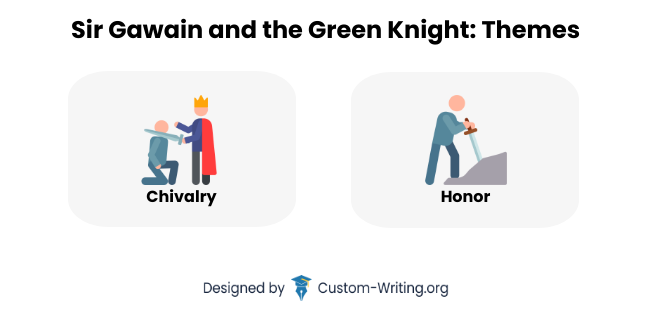
Chivalry in Sir Gawain and the Green Knight
Sir Gawain is a young knight, a nephew of King Arthur, whose devotion to the code is tested in this chivalric poem. Due to Gawain’s imperfections and human weaknesses, he is unable to withstand all of the challenges. Gawain falls short of the impossible standards dictated by the code. However, it makes him more humane in the eyes of the reader.
Gawain demonstrates essential chivalric qualities from the very beginning. When he accepts the Green Knight’s challenge, it shows that he is brave in his heart and loyal to his King. He also has good manners, and his speech is mild and courteous. A scene of dressing up, which happens almost a year after accepting the challenge, is described in detail. With all the symbols, emblems, and signs that appear on Gawain’s armor, the poet emphasizes how good a knight Gawain is. He also shares a special bond with his horse, one of the markers of chivalric poetry.
There are three prominent figures regarding the chivalry theme in Sir Gawain and the Green Knight: Gawain, Bertilak (and his court), and King Arthur (with his court). King Arthur’s court represents a chivalric code of conduct. Bertilak (with his alter ego—the Green Knight) ultimately means opposition to this values system. As the protagonist of Sir Gawain and the Green Knight chivalry poem, Gawain will be judged by Arthur’s and Lord Bertilak’s courts.
First, the Green Knight tests Gawain on the merit of his bravery and honesty. Accepting the challenge and keeping his word, the protagonist passes. Second, Lord Bertilak tests him in regard to his truthfulness and chastity.
Gawain’s inability to pass all the tests deeply hurt and shame him. By hiding the green girdle, which Lady Bertilak gave him, Gawain proves that a desire to live can be stronger than any artificial set of rules. However, in the eyes of Bertilak/the Green Knight, this omission does not make him a complete failure. While in the eyes of Gawain himself, he is a coward because he compromised his high chivalric and catholic standards. When Gawain comes back to Camelot, the readers see that Arthur’s court does not view Gawain as a coward at all. In return, they try to comfort him. They even suggest that they will wear a similar green girdle as a symbol of respect and support.
There is a hint of criticism in this last scene. Arthur’s court demonstrates a very shallow outlook on things. They do not want to listen about shame, and they laugh at Gawain’s story. The truth is more critical for Gawain and the Green Knight than for the round table’s knights. That is why the poet sets Gawain apart from the rest of the court.
There is a clear distinction between this social chivalry, focused on symbols, gestures, festivals, and the Gawain’s one. The latter becomes unattainable because of his idealistic views that leave no way out for weakness. There is also a third type of chivalry in the poem (after all, Bertilak is also called the knight). It values truth but accepts the possibility of failure.
Quotes about Chivalry
‘Would you grant me the grace,’ said Gawain to the king,
Sir Gawain, Gawain, Part I, Lines 343-347
‘To be gone from this bench and stand by you there,
If I without discourtesy might quit this board,
And if my liege lady misliked it not.
I would come to your counsel before your court noble.’
The good king and Gawain, and made great feast,
Sir Gawain, Narrator, Part I, Lines 482-490
With all dainties double, dishes rare,
With all manner of meat and minstrelsy both,
Such happiness wholly had they that day in hold.
Now take care, Sir Gawain,
That your courage wax not cold
When you must turn again
To your enterprise foretold.
When I ride in renown, and remember with shame
Sir Gawain, Gawain, Part IV, Lines 2434-2438
The faults and the frailty of the flesh perverse,
How its tenderness entices the foul taint of sin;
And so when praise and high prowess have pleased my heart,
A look at this love-lace will lower my pride.
The king comforts the knight, and the court all together
Sir Gawain, Narrator, Part IV, Lines 2513-2520
Agree with gay laughter and gracious intent
That the lords and the ladies belonging to the Table,
Each brother of that band, a baldric should have,
A belt borne oblique, of a bright green,
To be worn with one accord for that worthy’s sake.
So that was taken as a token by the Table Round,
And he honored that had it.
Honor in Sir Gawain and the Green Knight
The theme of honor in Sir Gawain and the Green Knight is closely related to chivalry. Nevertheless, these two concepts and themes are slightly different. The primary difference between them comes from the fact that chivalry is more of a social construct. It’s a code of behavior, an outside institution that dictates how one should be. Honor is something innate, a personal quality that can be guided by moral principles and laws. Gawain is a character that is acting based on both. However, throughout the poem, Gawain learns that social and private can contradict one another.
At the beginning of the poem, Gawain is the one knight that offers himself to save King Arthur’s life and his honor. He is the youngest and the least experienced member of the chivalry present at the table. But this action sets him aside from the rest of the round table’s knights. He also shows Christian-like humility in seeing other knights superior to him. He calls himself “the weakest” and says that his life is worth the least. As a loyal knight, Gawain accepts the challenge. One year later, he goes to the Green Chapel, expecting to face death. During his journey, when facing difficulties, Gawain prays continuously to God, the Virgin Mary, and Jesus.
Lord Bertilak’s exchange game vividly demonstrates a contradiction between the chivalric code and Gawain’s moral code. As a knight, Gawain was under an obligation to show courtly love to the lady. As a Christian, not to covet with the neighbor’s wife. In this challenging situation, Gawain chooses the latter.
In Sir Gawain and the Green Knight, the theme of honor is also connected with religion. However, even though the chivalric code heavily relied on Christian ideas, those were not identical. It is important to note that Arthur and his court in the poem represent chivalric views, a perfect appearance. At the same time, Bertilak demonstrates a Christian-like attitude even though he is not portrayed as a Christian. Gawain strives to be the ideal knight and a devout Christian. However, he faces the reality that he is simply a man with weaknesses and flaws. He fears for his life, yet he accepts the challenge. He trusts God when he needs shelter, but he relies on magic for protection before his encounter with the Green Knight. He sins and lies continuously throughout the poem. His honor is stained as both the knight and God’s worshipper. When Gawain learns that the Green Knight knows about the girdle, he feels ashamed. It is peculiar to see that Gawain is unable to forgive himself for his imperfection. The Green Knight commends him and shows mercy to him.
Despite lying and sinning, Gawain strives for perfection anyway. The readers see it in Gawain’s intention to wear the green girdle all his life as a sign of shame. However, the rest of the characters see him as an honorable man and a good knight. He managed to withstand most of the challenges, including the test of temptation. The Green Knight’s challenge and Lord Bertilak’s challenge allowed Gawain to embrace that he is just an imperfect human.
Quotes about Honor
‘Would you, my worthy lord,’ said Gawain to the king,
Sir Gawain, Gawain, Part I, Lines 343-355
‘bid me abandon this bench and stand by you there,
so that I without discourtesy might be excused from the table,
and my liege lady was not loth to permit me,
I would come to your counsel before your courtiers fair.
For I find it unfitting, as it is held,
when a challenge in your chamber makes choice so exalted,
though you yourself be desirous to accept it in person,
while many bold men about you on the bench are seated:
on earth there are, I hold, none more honest of purpose,
no figures fairer on the field where fighting is waged.
I am the weakest, I am aware, and in wit feeblest,
and the least loss, if l live not if one would learn the truth.’
‘In good faith,’ quoth the good knight, ‘I Gawain am called
Sir Gawain, Gawain and the Green Knight, Part I, Lines 381-389
who bring thee this buffet, let be what may follow;
and at this time a twelvemonth in thy turn have another
with whatever weapon thou wilt, and in the world with
none else but for me.’
The other man answered again:
‘I am passing pleased,’ said he,
‘upon my life, Sir Gawain,
that this stroke should be struck by thee.’
For which cause the knight had in comely wise
Sir Gawain, Narrator, Part II, Lines 648-655
on the inner side of his shield, her image repainted,
that when he cast his eyes thither his courage never failed.
The fifth five that was used, as I find, by this knight
was free-giving and friendliness first before all,
and chastity and chivalry ever changeless and straight,
and piety surpassing all points: these perfect five
were hasped upon him harder than on any man else.
‘Upon my word,’ said Gawain, ‘that is well, I guess;
Sir Gawain, Gawain, Part III, Lines 1241-1247
though I’m not now he of whom you are speaking
to attain to such honor as here you tell of
I am a knight unworthy, as well indeed I know
by God, I would be glad, if good to you seemed
whatever I could say, or in-service could offer
to the pleasure of your excellence-it would be pure delight.’
Other Themes in Sir Gawain and the Green Knight
Honor and chivalry are the central themes of Sir Gawain and the Green Knight. However, the poem also includes many other topics worth exploring. These include nature, the supernatural, reputation, courtly love, and mortality.
Let’s take a closer look at them.
Nature Theme of Sir Gawain and the Green Knight
The relationship between humans and nature is an essential topic in the poem. Readers can see it in the examples of two main characters: Lord Bertilak and Sir Gawain.
Lord Bertilak is also the Green Knight. He appears in the middle of festivities in Camelot, all green and mighty built, like the embodiment of the natural force challenging civilization. The location of his castle and the hunting scenes also represent the character’s connection to the world of nature.
Sir Gawain faces several situations during his quest in which he has to stand against nature or natural instincts:
- He faces the wilderness and cold wintry weather when leaving Camelot and Lord Bertilak’s court.
- He fights the natural temptation to accept the love of Lady Bertilak he is attracted to.
- He has to withstand the desire to save his own life.
Though the protagonist manages to pass the first two tests, he fails the last one. His acceptance of the green girdle shows that, finally, instincts overcome the code of conduct that civilization demands.
Themes of Sir Gawain and the Green Knight: The Supernatural
The supernatural is mostly associated with the Green Knight. The first glance at him reveals that he’s a mystical creature. He is described as the largest man alive. Besides, his clothes and the man himself are entirely green. The whole court is convinced of his magical nature when the strange knight picks up the head cut off by Sir Gawain and speaks with it.
At the poem’s end, the readers learn that the Green Knight wasn’t supernatural himself. Instead, he was enchanted by the sorceress Morgan le Fay, who wanted to hurt Guinevere. The poem implies that even magical creatures can’t be an excuse for a knight to forget about his honor.
Reputation Theme in Sir Gawain and the Green Knight
Collective principles and common opinion have a significant power over the poem’s characters. They often define the identity of people spoken of and cause them to act in a certain way.
The following episodes vividly demonstrate the importance of reputation and its impact on the characters’ behavior:
- Challenge of the Green Knight. The Green Knight says that he came to Camelot because the knights of King Arthur’s court are renowned for their bravery. The necessity to defend this reputation induces Sir Gawain to accept the beheading game proposed by the Green Knight.
- Scenes between Sir Gawain and Lady Bertilak. When trying to seduce Sir Gawain, Lady Bertilak says he is known for his courtesy and states that Gawain is not Gawain if he refuses to kiss her. In contradicting the lady, the protagonist tries to be careful not to mar his reputation and yet stick to his beliefs.
Courtly Love in Sir Gawain and the Green Knight
Courtly love is a theme that often appears in the Medieval literature. It was a secret romance between a knight and a lady, usually married to some other noblemen. In the poem, the theme of courtly love is shown in the relationship between Sir Gawain and Lady Bertilak.
Lady Bertilak is described as a charming woman, superior even to Queen Guinevere. Courting Lady Bertilak, Sir Gawain finds himself in a difficult situation. On one hand, he has to be polite to the lady and obey her wishes. On the other hand, chivalry and the Christian code of conduct demand that he doesn’t betray the trust of his host, Lord Bertilak.
Sir Gawain and the Green Knight Theme of Mortality
The last theme explored throughout the poem is the theme of mortality. The author hints at it from the first lines when he writes about the fall of Troy. The theme is more evident when the Green Knight appears and offers his beheading game. At first, Sir Gawain is ready to accept the challenge and die for his king. But as the time of the return hit approaches, he finds that it’s not so easy to face the inevitability of death.
Through Sir Gawain’s quest, the author shows the horror the interaction with death and mortality inflicts on a human being. Finally, not greed or lust causes Sir Gawain to behave dishonestly. It’s the desire to live.
